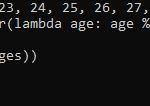OS module in Python provides functions for interacting with the operating system. The os.urandom(size) is a method often used when it comes to encryption. It is used as a cryptographically secure pseudo-random number generator.
This method returns random bytes from an OS-specific randomness source, which is unpredictable enough for cryptographic applications. However, its quality depends on the OS.
Table of Contents
os.urandom() example

import os key = os.urandom(32) print(key) #output: b'\x9a\x1a|\n\x14G\x1c\xd8\x87\xc9&\xd50\xc4\x1d\x9a1y\xe5\x8cg\xe2\xde$\xce\xc5/\x8d\xc0S\x8e\xd0'
Convert urandom() data to a string
We can use base64 to convert os.urandom()’s bytes result to a string.
import os
from base64 import b64encode
key = os.urandom(64)
print(key)
#output: b'\xc7N\x98\xa2w\xd8L-H&\x98\xfd\xcf\xa6\x12]F\xf6\x87\xe3%t\xa6\xf8\x91E\xb2\xce\xf0\x0fg\x111\x05\x0f!\xc3S\x99\xd1At\x10\xd1\xcf6\xf0z\xc8Y\xfca\xdf\xa8\xee\xf9\xbbB\xb9\x91%\x8e\x08&'
text = b64encode(key).decode('utf-8')
print(text)
#output: x06YonfYTC1IJpj9z6YSXUb2h+MldKb4kUWyzvAPZxExBQ8hw1OZ0UF0ENHPNvB6yFn8Yd+o7vm7QrmRJY4IJg==
Use urandom() in encryption
We can combine this method to generate keys for the encryption method.
key = os.urandom(32) iv = os.urandom(16) cipher = Cipher(algorithms.AES(key), modes.CBC(iv))
You can read about the top encryption libraries for Python in another post.



